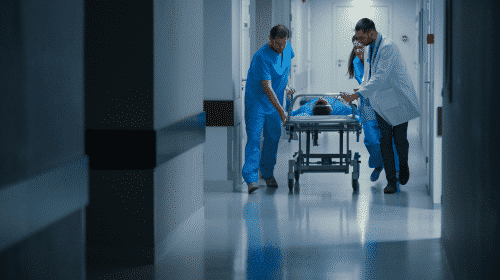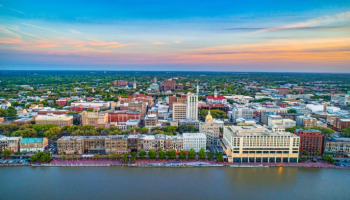Expert Insights
I don’t normally promote government regulations, but I do see a need for some oversight for transitional housing and sober living homes. While assisting a relative to find such housing, I discovered just how dismal some of these dwellings can be. (And the website pictures don’t match up!) These houses are eligible for government funding, so they should at least be held to certain common standards so that vulnerable people aren’t taken advantage of. Overcrowding and insufficient restrooms, kitchens, and laundry facilities should be unacceptable; and having consistent guidelines for sobriety-related requirements would be helpful.
~ Rita Milios
How Much Does Drug Rehab Cost in Georgia?
Georgia is ranked 8th nationwide in terms of addiction treatment affordability, with an average cost of drug and alcohol rehab of $55,475 (without insurance).
- Medical detox is the most expensive, with an average cost of $136,766
- Long-term inpatient drug rehab in Georgia costs an average of $48,953
- Outpatient addiction treatment in Georgia costs an average of $8,134
- Outpatient methadone treatment is the most affordable, with an average cost of $7,227
How to Pay for Drug Rehab in Georgia
As of 2024, there were over 390 drug rehab facilities across the state of Georgia. These facilities accept several payment methods. Of those treatment facilities, the following numbers reflect how many accept their respective payment methods:
Low-Cost and Free Rehab Options in Georgia
Many are under the guise that addiction treatment itself is a luxury they could never afford. However, this couldn’t be further from the truth. While getting help can come with some considerable costs, like room and board, there are affordable and accredited Georgia drug rehabs providing high-quality care.
State-funded facilities typically offer free (or low-cost) help for substance use disorders. They receive their funding from federal, state, and sometimes local governments—who get it from grants, insurance programs like Medicaid, and more. They may offer free services, while others will work with you to create a payment plan based on your financial situation. You can also apply for grants and scholarships, as long as you’re eligible.
Free facilities offer the same services as other treatment centers in Georgia. For example, they’ll offer detox, interim care if their facilities are complete, counseling, peer support groups, and mental health care.
To be eligible for a state-funded program, you need to apply. This would include providing the following information and documentation:
- Your citizenship status
- Your yearly income
- Your family size
- Proof that you do not have health insurance
- Proof of residency within the state of Georgia
Does Insurance Cover Rehab Center Costs?
Ever since the Mental Health Parity and Addiction Equity Act (MHPAEA) of 2008, all states, including Georgia, require that healthcare insurers offer plans that include mental health and substance use disorder benefits.2
Private Insurance
Private health insurance plans generally cover the cost of care for your drug or alcohol addiction. Some of the top insurance providers that cover rehab include Blue Cross Blue Shield, Humana, Aetna, COBRA, United Healthcare, and Cigna.
Medicaid
Medicaid is a state and federal program offering healthcare to low-income families. In terms of drug rehab in Georgia, Medicaid will cover all the basic aspects of substance use treatment. This would include screenings, medications, family counseling, inpatient care, long-term residential care, detox, outpatient, and more.
Medicare
Medicare is a federal health insurance program designed for seniors 65 and older and individuals with disabilities. Medicare comes with a monthly premium based on the individual’s income. Those who earn less pay lower premiums.
How to Finance Addiction Treatment in Georgia
Whether you have insurance coverage or not, you still may not be able to afford the costs associated with addiction treatment. Fortunately, there are plenty of options for paying for professional help.
Choose a Program that Offers Payment Plans: Rather than paying a lump sum of thousands of dollars, many facilities in the state of Georgia will allow you to pay for your treatment incrementally. It works similarly to paying off a loan, meaning that you’ll likely have to pay interest or fees associated with the rehab’s particular plan.
Apply for a Scholarship: Scholarships are mostly provided by both inpatient and outpatient facilities. However, you can also find scholarships through corporations that manage private facilities and non-profit foundations.
Find a Sliding-Scale Program: The sliding scale center is common practice for many alcohol and drug rehab centers in Georgia. The program is a flexible system that charges patients only what they can reasonably afford based on their income and other financial resources.
Georgia Alcohol and Drug Use Statistics
Let’s take a quick look at how much opioid-related deaths have grown over the years:1

From 2012 to 2020, the total number of opioid overdose deaths increased by 140%, going from 554 to 1332.

Opioid overdoses accounted for 7,954 Emergency Room visits and 2,822 hospitalizations in 2020.

The highest numbers of fatal opioid overdoses, ER visits, and hospitalizations were in urban areas.

From 2019 to 2020, fentanyl-involved overdoses increased by 107%, causing 813 overdose fatalities in 2020.
Prescribing practices regarding opioid medications have become stricter compared to the early 1990s. However, it has become evident that the previously irresponsible prescribing practices are partially to blame for the opioid epidemic.
For perspective, there were roughly 71 opioid prescriptions written for every 100 people in Georgia—and that was just in 2006.1 During this time, the national average was approximately 59 prescriptions per 100 people. What’s more, those prescription numbers have climbed significantly for Georgia, despite these stricter practices.
Alcohol and Drug Laws in Georgia
Georgia legislation is working hard to combat this epidemic and hopefully give second chances in the process. Here are a couple of substance use-related laws you should know about:
The Georgia 911 Medical Amnesty Law: The Georgia 911 Medical Amnesty Law provides limited immunity for those seeking emergency medical care where illicit substances are involved. In other words, if you or someone else owns certain substances or paraphernalia and are experiencing an overdose, you’ll be shielded from prosecution upon calling 911.6
The Mental Health Parity and Addiction Equity Act of 2008: The Mental Health Parity and Addiction Equity Act was passed in 2008, and the state has been smoothing out the finer details since. This parity law argues that substance use and mental health treatment should be covered by insurance, just like any other medical condition. Under this law, insurance providers are prohibited from limiting the benefits associated with mental health care and substance abuse programs so that help may be more accessible.7
Resources
- National Institute on Drug Abuse. (2020, April 3). Georgia: Opioid-Involved Deaths and Related Harms.
- FindTreatment.gov. (n.d.). FindTreatment.gov.
- U.S. Department of Health and Human Services. (2021, November 10). Mental Health and Substance Use Insurance Help.
- Substance Abuse and Mental Health Services Administration. (2021, October 13). Grants.
- Shah, M., & Huecker, M. R. (2021, October 11). Opioid Withdrawal. Treasure Island (FL): StatPearls Publishing.
- LGBT Substance Use—Beyond Statistics. (n.d.). SocialWorkToday.
- Gwinnett, Newton, Rockdale County Health Departments. (n.d.). The Georgia 9-1-1 Medical Amnesty Law.
- Eldridge, E. 2021, February 11). Parity Law Aims to Equalize Mental Health and Addiction Coverage With Physical Care. Georgia Public Broadcasting.








